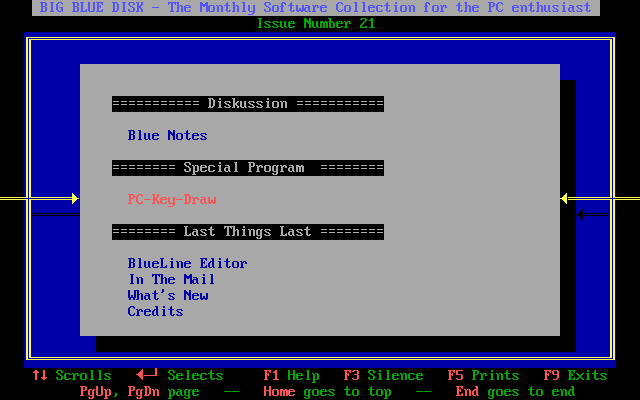Retro Replay Review
Gameplay
Big Blue Disk #21 delivers a surprisingly diverse set of interactive experiences through its text-based menu system. Navigating between titles and utilities is intuitive: you select an entry by typing its number or name, and the program launches seamlessly. This straightforward approach means you spend less time fumbling through file directories and more time enjoying the software itself.
(HEY YOU!! We hope you enjoy! We try not to run ads. So basically, this is a very expensive hobby running this site. Please consider joining us for updates, forums, and more. Network w/ us to make some cash or friends while retro gaming, and you can win some free retro games for posting. Okay, carry on 👍)
Crazy Eights faithfully adapts the classic card game to your screen. The rules are exactly as you’d expect, and the computer opponent plays a competent (if sometimes predictable) game. Drawing cards, discarding, and calling out “Crazy Eights!” all happen via simple keystrokes, making the experience feel fast-paced despite the limitations of a text interface.
The Computer Quiz offers a refreshing change of pace, testing your knowledge across multiple categories. Questions appear one at a time, and you type in your answers directly—no multiple-choice shortcuts here. The quiz tracks your score in real time and even provides feedback on incorrect responses, encouraging you to learn as you go.
Graphics
Because Big Blue Disk #21 is built around a text-mode environment, don’t expect pixel-perfect sprites or high-resolution backgrounds. Instead, the games rely on ASCII art and clever use of character attributes (such as bold or inverse text) to convey cards, menus, and on-screen prompts.
In Crazy Eights, each card is represented by a bordered cell containing its rank and suit symbol. While simple, these representations are immediately recognizable and help maintain the feel of playing with a physical deck. The interface uses spacing and highlighting to show where you can play cards or draw from the deck.
The Computer Quiz keeps things minimal, focusing on legible text with occasional ASCII embellishments around the question prompts. The fireworks utility is the real graphical treat here: it uses color codes and timed character bursts to simulate a short, charming fireworks display—proof that even in a purely text-driven system, creativity can shine through.
Story
As a collection of standalone titles and utilities, Big Blue Disk #21 doesn’t offer a unified narrative experience. Instead, each piece of software brings its own “story” in terms of objectives and engagement. Crazy Eights tells the familiar tale of outwitting your opponents through strategic card play, while The Computer Quiz unfolds as a test of general knowledge.
Between games, the magazine-style articles included in this issue provide helpful context, tutorials, and background on emerging software trends. These write-ups help ground the collection in the broader world of home computing circa the late 1980s, giving you a sense of progress and community as you explore the disk.
Even the non-game utilities contribute to a kind of meta-narrative: you’re not just a passive consumer but an active participant in a growing ecosystem. Whether you’re tweaking a small utility or marveling at the fireworks display, there’s a subtle story of empowerment—showing how far personal computing had come at the time.
Overall Experience
Big Blue Disk #21 offers excellent value for anyone interested in retro computing or looking for straightforward, no-frills entertainment. The two main games are easy to pick up but offer enough depth to keep you engaged, while the accompanying articles and utilities add educational and practical benefits.
The text-based menu system ties everything together neatly, ensuring you never feel lost when switching between programs. Even in the absence of flashy graphics, the careful design and variety make for an engaging session each time you boot the disk.
Whether you’re curious about the roots of casual gaming or simply seeking a lightweight diversion on an Apple II or compatible system, Big Blue Disk #21 delivers on both nostalgia and playability. It’s a solid snapshot of software subscription services at their best—diverse, polished, and endlessly charming in its simplicity.
 Retro Replay Retro Replay gaming reviews, news, emulation, geek stuff and more!
Retro Replay Retro Replay gaming reviews, news, emulation, geek stuff and more!







Reviews
There are no reviews yet.